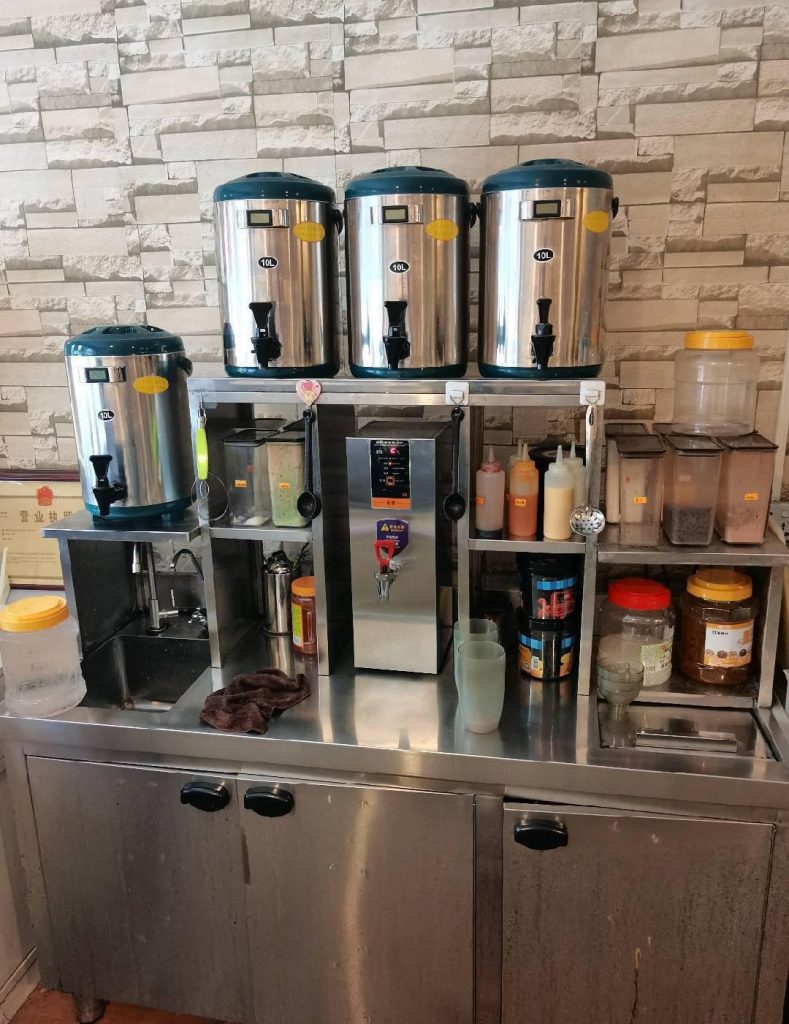The global bubble tea market, valued at $2.8 billion in 2023, is projected to grow at a CAGR of 15% through 2030, driven by Gen Z’s demand for tech-driven, eco-conscious beverage experiences. For café owners and franchise operators, investing in a bubble tea equipment factory that combines innovation, scalability, and sustainability is no longer optional—it’s critical to survival. This article explores how modern factories are redefining equipment design with AI-powered automation, circular manufacturing practices, and hyper-localized customization to help businesses thrive in a post-pandemic world.
—
Why Modern Bubble Tea Equipment Factories Are Essential
Generic suppliers risk delivering obsolete or low-quality machines. Professional factories specialize in:
1. Smart Equipment for Efficiency
– IoT-Enabled Brewers: Remote monitoring of tea temperatures (±1°C accuracy) and automated cleanup schedules reduce labor costs by 30%.
– AI-Driven Inventory Management: Predictive analytics track ingredient usage, minimizing waste and restocking errors.
2. Sustainability as a Standard
– Circular Design: Machines built with 100% recyclable stainless steel and modular components extend lifespans by 50%.
– Energy Savings: Inverter compressors cut power use by 25%, while solar-ready designs reduce grid dependency.
3. Localized Customization
– Regional Compliance: CE (EU), FDA (US), and HACCP (global) certifications ensure seamless market entry.
– Cultural Adaptations: Halal-certified milk systems for MENA markets or heat-resistant handles for tropical climates.
—
Core Equipment for a 2030 Bubble Tea Shop
Future-proof your store with these tech-forward, eco-friendly machines:
1. AI-Powered Brewing Systems
– Adaptive Tea Extractors: Machine learning adjusts steeping times based on real-time sales data (e.g., more oolong during rainy days).
– Self-Cleaning Kettles: UV-C sterilization and reverse osmosis filters reduce manual cleaning by 90%.
2. Nitro Cold Brew Stations
– Nitrogen Infusion: Creamy, zero-sugar lattes with 30-second pour times.
– Smart Temperature Control: Maintain 3–5°C for optimal nitrogen texture.
3. Zero-Waste Packaging Solutions
– Compostable Cup Sealers: Heat-seal compostable cups in under 5 seconds.
– Tapioca Pearl Recyclers: Separate pearls from wastewater for reuse in future batches.
4. Modular Display Systems
– Refrigerated Towers: LED-lit, stackable units showcase pre-made toppings while reducing energy use by 40%.
—
Customization: From Niche Cafés to Global Franchises
One-size-fits-all equipment fails in today’s fragmented market. Factories now offer:
1. Scalable Configurations
– Tier 1 (Indie Cafés): Compact countertop brewers (30 cups/hour) with manual fillers.
– Tier 3 (Franchises): Industrial systems (500+ cups/hour) with robotic milk steaming arms.
2. Branding Integration
– Laser Engraving: Permanent logos on stainless steel surfaces.
– Dynamic Color Schemes: Swappable panels for seasonal campaigns.
3. Specialized Features
– CBD/Oat Milk Ports: Dedicated dispensers for trending plant-based options.
– Nitrogen Canisters: On-site gas integration for nitro drinks.
—
Quality Assurance in a Competitive Market
Factories must guarantee reliability to avoid costly downtimes:
1. Material Testing
– XRF scans verify stainless steel purity (304 grade).
– Pressure tests validate durability up to 150°C.
2. Performance Trials
– Simulate 1,000+ cycles of tea brewing and boba straining.
– Real-world testing in partner cafés (e.g., 12-hour shifts in Taipei stores).
3. After-Sales Support
– 24/7 remote diagnostics via IoT sensors.
– 48-hour spare part delivery via regional hubs in Singapore and Frankfurt.
—
Case Study: A Southeast Asian Franchise’s 200% ROI
A Bangkok-based chain partnered with a Chinese factory to optimize operations:
1. Smart Filling Machines: Reduced service time by 40% with auto-capping and ice-crushing modules.
2. Solar-Compatible Display Units: Cut energy costs by 35% in outdoor food courts.
3. Localized Assembly: Avoided 18% import tariffs by using Vietnam-based assemblers.
Result: $2.1 million revenue growth in 18 months.
—
Future Trends: AI, Blockchain, and Beyond
Stay ahead with these disruptive innovations:
– Blockchain Traceability: Log tea and pearl origins on immutable ledgers for ESG audits.
– Voice Commerce: Natural language processing for hands-free orders (e.g., “Alexa, brew a matcha nitro cold brew”).
– Carbon Credit Dashboards: Machines calculate per-cup emissions, letting customers offset them via app.
—
How to Partner with a Future-Focused Factory
1. Audit Suppliers: Ensure they invest in R&D (e.g., patents for AI brewing algorithms).
2. Demand Transparency: Request blockchain-based material certifications.
3. Leverage Local Hubs: Use regional warehouses for faster, cheaper shipping.
—
Conclusion
The bubble tea equipment industry is at an inflection point where sustainability, intelligence, and customization define success. By partnering with a factory that integrates IoT, circular design, and regional agility, café owners can future-proof operations, reduce costs, and delight eco-conscious customers.
Ready to lead the next wave? Collaborate with a manufacturer that turns trend-driven challenges into competitive advantages.
Article link:https://www.vlefooena.com/manufacturer/3714/


No reply content